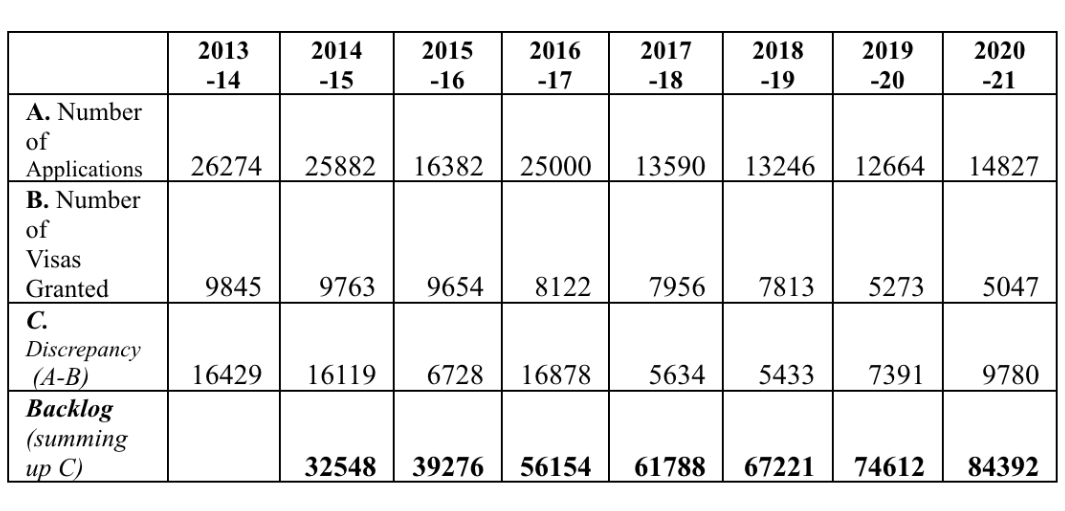1. Since 2013
The backlog is exacerbating
As of 13 July 2021, the Department of Home Affairs has 113,509 parent visa applications (Subclass 103, 143, 173, 804, 864, 884) on hand (Link).
In spite of the backlog, the Government has reduced the number of allocated places to parent visas to 4,500 each year in in 2020-21 (Link) and 2021-22 (Link). It was a substantial reduction from an allocation of 8,675 visas in 2018-19 and 7,344 visas in 2019-20 (Link).
The following table and chart were created based on the information provided by the Minister for Immigration, Citizenship, Migrant Services and Multicultural Affairs in response to Senator Kristina Keneally’s request on 22 November 2021 (Link).
We have been requesting the latest numbers since the 6th of April 2022 at the FOI (Freedom Of Informations) division of the Home Affairs department but we are still waiting for their reply.
|
2013 -14 |
2014 -15 |
2015 -16 |
2016 -17 |
2017 -18 |
2018 -19 |
2019 -20 |
2020 -21 |
|
|
A. Number of Applications |
26274 | 25882 | 16382 | 25000 | 13590 | 13246 | 12664 | 14827 |
|
B. Number of Visas Granted |
9845 | 9763 | 9654 | 8122 | 7956 | 7813 | 5273 | 5047 |
|
C. Discrepancy (A-B) |
16429 | 16119 | 6728 | 16878 | 5634 | 5433 | 7391 | 9780 |
|
Backlog (summing up C) |
32548 | 39276 | 56154 | 61788 | 67221 | 74612 | 84392 |

Backlog of Parent Visa Applications (2013-21)
2. Since 2013
Waiting times are lengthening
While Non-Contributory Parent Visas (Subclass 103, 804) can take up to 30 years to process before visa grant, Contributory Parent Visas (Subclass 143, 173, 864 and 884) which cost AUD$47,825 promising a shorter wait time, now also takes more than 15 years to process.
Go Matilda, a migration agency, created a Visa Processing Time Calculator for Contributory Parent Visas (Subclass 143, 173, 864 and 884) based on the number of applications received and number of visa grants each year (Link). The Contributory Parent Visa Subclasses have approximately 3,600 visa grants a year.
| Jul-16 | Jul-17 | Jul-18 | Jul-19 | Jul-20 | Jul-21 | |
| Wait Times (in months) | 9.1 | 65.4 | 98.5 | 133.1 | 163.6 | 201.7 |
| Approximate Month of Visa Grant | Jul-22 | Mar-27 | Dec-29 | Nov-32 | May-35 | Jul-38 |

Average processing time in months
3. In General
Parents visas are critical to attracting skilled migrants to Australia
Parent visas are critical to attracting skilled migrants from overseas. Of note, Australia’s sponsored parent permanent visa program has attracted medical specialists to relocate to Australia (Link). However, with the current backlog and wait times, it is anticipated that many parents will be “long gone” before they are granted permanent residency (Link).
While the Government has emphasised the importance of focusing on visa sub-types that benefit Australia’s economy, the benefits of parent visas are overlooked.
Adjunct Professor Alex Reilly from the University of Adelaide noted the importance of “relationships” in Australia’s migration program (Link):

What is sometimes lost in Australia, with a single-minded focus on migration to boost the economy, is that immigration is not only about economic growth. It is also about relationships.”
“Permanent migrants are future citizens. Migration builds community, and the ability of migrants to sponsor their broader family will deepen their connections and commitment to Australia.”
“Although skilled worker visas allow for partners and children to accompany them, there is no provision for extended family. This makes these migrants potentially more vulnerable and isolated, less committed to Australia and, some have suggested, less productive as workers.”
“If they were allowed to enter Australia, these extended family members could offer emotional support and practical assistance to their loved ones working here, such as child care.”
A study conducted by academics at the University of Sydney and the University of New South Wales explored the importance of “migrant grandparents” (also known as “flying grannies”) who provided “intensive childcare” for their grandchildren in Australia (Link). Despite this, the lack of parent visa options and current wait times have been causing instability for Australian parents as well as their children.
The Law Council also notes the importance of parent visas in Australia’s migration program (Link):

6. The Law Council also considers that the Department should take action to arrest to increasing backlog in Parent visas. While Parent visa holders may not have as beneficial impact on the economy as other migrants, access to family reunion is relevant to a country’s attractiveness for skilled migration, and there are also social and community benefits to completing the family unit for migrant families.”
“57. The Law Council’s view is that Parent visas have a positive social and economic benefit to Australia society and should be maintained. The rights to respect for the family should also be protected and fulfilled. The Law Council agrees with the Productivity Commission that migrants are generally more attracted to countries which allow family reunification. Parents assist younger migrant families, particularly those with children, settle into life in Australia, including by providing child care assistance. The Intergenerational Report mentions that ‘attitudes towards women returning to work after having children have also shifted; there is increased societal support for women combining work and parenting responsibilities’.”
If the issue of backlog is not addressed promptly and continues to worsen, skilled migrants will have no choice but to leave Australia in order to spend time with their parents in their parents’ final years. In New Zealand, skilled migrants shared their emotional turmoil of not being able to reunite with their parents in their final years (Link) and their consideration to leave New Zealand (Link).
